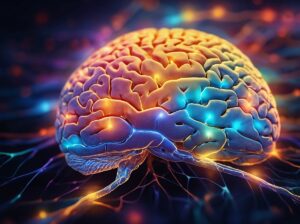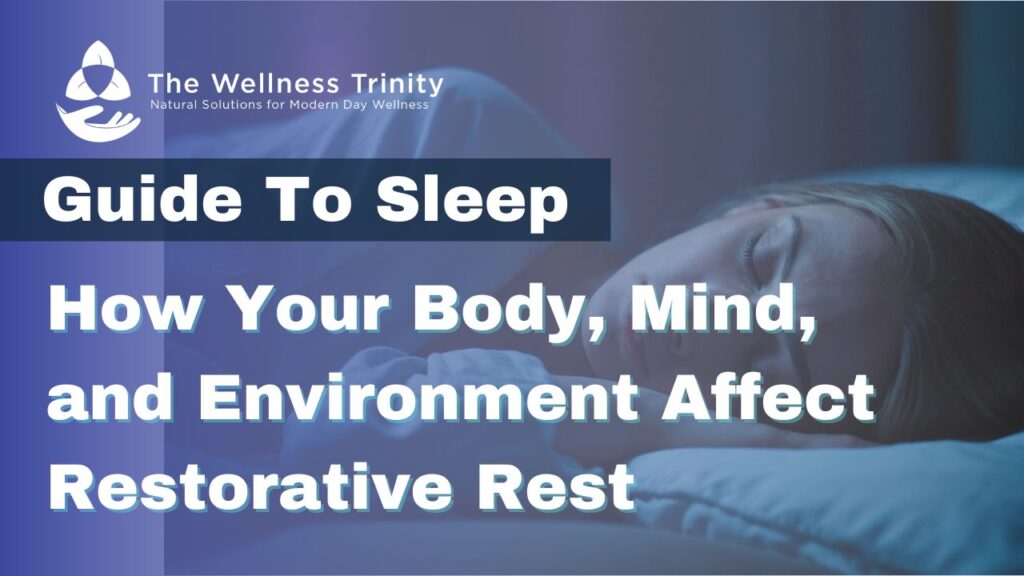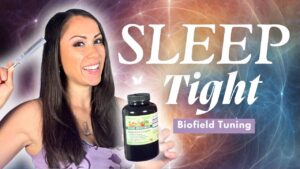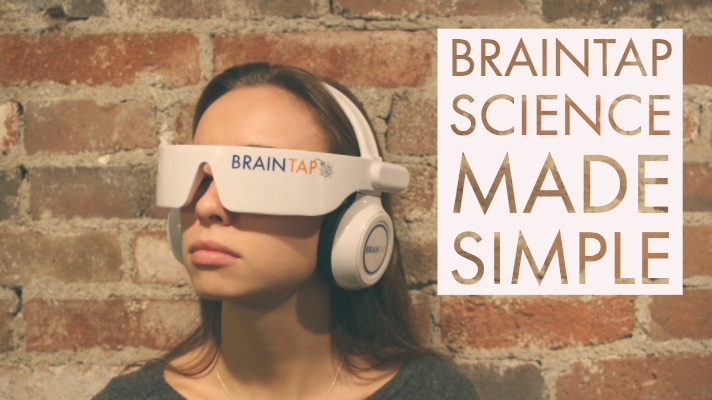The Ultimate Guide to Sleep: How Your Body, Mind, and Environment Affect Restorative Rest
Sleep is far more than a nightly reset—it’s a critical period for brain detox, hormone regulation, cellular repair, and emotional balance. While many people view sleep as downtime, it is a highly active state where your body performs essential maintenance, restores energy, and strengthens cognitive and emotional function. Yet, millions of adults struggle with poor sleep due to stress, environmental factors, nutrient deficiencies, and underlying health issues. Chronic poor sleep is not just a minor inconvenience—it can significantly impair mental clarity, emotional resilience, immune function, and long-term health.
Understanding the systems that regulate sleep—and how lifestyle, environment, and physiology interact—is key to restoring deep, restorative rest. This guide will explore how your thyroid, adrenals, mitochondria, liver, gut, and nervous system impact sleep. We’ll also discuss environmental factors like EMFs and frequencies, the role of nutrients, and strategies to optimize your sleep naturally.
Why Sleep is So Important
Sleep is a multi-layered biological process that goes beyond simply resting the body. During deep sleep, several essential functions co-occur:
Brain Detox

Your brain has a specialized waste-clearing system called the glymphatic system. During deep sleep, cerebrospinal fluid flows more freely through the brain, flushing out toxins, metabolic byproducts, and harmful proteins like beta-amyloid, which is linked to cognitive decline and neurodegenerative diseases. Without sufficient deep sleep, this detoxification process is compromised, leading to brain fog, memory issues, and emotional dysregulation.
Hormone Balance
Sleep is critical for hormone regulation. During the night, your body balances key hormones, including:
- Growth hormone: Promotes tissue repair, muscle growth, and mitochondrial restoration.
- Cortisol: Follows a natural rhythm that peaks in the morning and falls at night. Disrupted sleep disrupts this rhythm, affecting the stress response and metabolism.
- Melatonin: The sleep hormone, essential for initiating restorative sleep.
- Thyroid hormones: Influence metabolism and body temperature, both of which are crucial for sleep quality.
Cellular Repair
Mitochondria, the energy powerhouses of your cells, repair and replenish during sleep. This ensures your body has the energy (ATP) required for cognitive function, immune response, and physical performance the following day. Poor sleep interrupts mitochondrial repair, leaving you tired, mentally foggy, and physically depleted.
Emotional Reset
During REM sleep, your brain processes emotions, consolidates memories, and recalibrates your nervous system. Inadequate REM sleep can lead to heightened anxiety, irritability, and reduced emotional resilience. Over time, chronic sleep deficits increase the risk of mood disorders such as depression and generalized anxiety.
Bottom line: Chronic poor sleep leads to fatigue, brain fog, mood disturbances, weight gain, inflammation, and higher risk for chronic illnesses like diabetes, cardiovascular disease, and neurodegenerative conditions.
How Your Thyroid, Adrenals, Hormones and Mitochondria Affect Sleep
Thyroid
The thyroid gland regulates metabolism, body temperature, and energy levels—all of which directly affect sleep.
- Hypothyroidism (low thyroid function): Causes fatigue, poor body temperature regulation, and disrupted deep sleep. People with low thyroid function often wake up feeling unrefreshed despite sleeping long hours.
- Hyperthyroidism (overactive thyroid): Leads to restlessness, racing thoughts, night sweats, and insomnia, making it difficult to enter deep, restorative sleep.
Thyroid hormones also influence the central nervous system and neurotransmitter function, affecting mood, stress response, and the ability to relax at night.
Adrenals
The adrenal glands control cortisol and adrenaline, which regulate your stress response and circadian rhythm. They also influence female and male sex hormones (estrogen, progesterone, testosterone), which affect sleep quality:
- High evening cortisol: Keeps the body “wired,” preventing restful sleep and reducing deep sleep duration. Anxie-Tone can help modulate cortisol and promote relaxation.
- Low cortisol: Leads to fragmented sleep, early morning awakenings, and overall fatigue. High-Stress Adrenal Support can help restore balanced adrenal function.
Hormone fluctuations

In women, estrogen and progesterone influence sleep onset, deep sleep, and body temperature regulation. In men, low testosterone can contribute to fatigue and restless sleep. Feminine Advantage supports estrogen and progesterone, while Masculine Advantage supports testosterone.
If you suspect your adrenal glands, estrogen, progesterone, or testosterone are affecting your sleep, you can take a simple at-home saliva hormone test here: Salivary Hormones Test.
Mitochondria
Mitochondria are responsible for cellular energy production. During deep sleep:
- Mitochondria undergo repair and replication.
- Cells replenish ATP stores to fuel the next day.
If mitochondrial function is impaired, even a full night of sleep may not be sufficient to restore energy. This can manifest as chronic fatigue, brain fog, and decreased physical and cognitive performance.
Liver & Gallbladder
The liver is your primary detox organ, working around the clock to filter toxins, metabolize hormones, and regulate blood sugar. Sleep is when the liver is particularly active in processing waste products:
- Detoxification: Clears metabolic byproducts, environmental toxins, and excess hormones.
- Blood Sugar Regulation: Stabilizes glucose overnight to prevent night waking caused by hypoglycemia.
- Hormonal Metabolism: Processes thyroid hormones, estrogen, progesterone, and cortisol; imbalances can disrupt sleep architecture.
The gallbladder supports fat digestion by releasing bile, which indirectly affects liver function and nutrient absorption. Poor bile flow can result in digestive discomfort, which may interfere with restful sleep. While uncovering the root cause of bile flow challenges may require deeper investigative work, incorporating GB Support with your meals can help stimulate bile production and support healthy digestion right away.
Nutrient Deficiencies That Disrupt Sleep
Certain vitamins, minerals, and amino acids are critical for sleep quality. Quality is key, and we recommend whole food nutrient supplementation from Food Research to ensure optimal absorption and effectiveness. Key nutrients include:
- Magnesium: Helps relax muscles and supports neurotransmitters like GABA, which promote calm and sleep.
- Vitamin D: Low levels are associated with shorter sleep duration and poorer sleep efficiency.
- B Vitamins (B6, B12, Folate): Required for melatonin and serotonin production.
- Zinc: Supports hormone production, neural signaling, and relaxation.
- Calcium: Supports neural signaling and relaxation.
- Iron: Low iron can cause restless legs syndrome, making it difficult to stay asleep.
- Tryptophan: Precursor to serotonin and melatonin; deficiency can impair sleep onset and quality.
Dialing in these nutrients with testing to determine your specific deficiencies is highly beneficial. Personalized supplementation ensures your body has the precise support it needs for restorative sleep. You can book an initial consultation at www.cerebraldetox.com to get started.
Toxins, Pathogens, and Sleep Disruption
Exposure to environmental toxins or pathogens like parasites can severely impact sleep:
- Chronic Inflammation: Pathogens trigger cytokine release, which increases wakefulness and decreases deep sleep.
- Digestive Discomfort: Gut imbalances and infections disrupt rest and can cause nighttime waking.
- Hormonal Interference: Toxins impact cortisol, thyroid hormones, and melatonin, impairing sleep quality.
Supporting detox pathways, addressing gut infections, and reducing toxic exposure are key strategies for improving restorative sleep. The most effective approach is to discover exactly what toxins and pathogens are affecting your body so you can optimize your detoxification protocol.
You can book your initial consultation at www.cerebraldetox.com to get started.
The Endocannabinoid System and Sleep
The endocannabinoid system (ECS) is a critical regulator of sleep-wake cycles:
- Sleep Stages: Helps balance REM and non-REM cycles for restorative sleep.
- Stress & Anxiety: Reduces hyperarousal that prevents sleep onset.
- Pain Management: Decreases discomfort that may wake you during the night.
- Hormonal Balance: Supports optimal cortisol and melatonin rhythms.
How Hemp Oil Supports the ECS
Hemp oil, particularly in the form of CBD (cannabidiol), interacts with the ECS to promote:
- Balanced Sleep Cycles: Facilitates deeper and more consistent rest.
- Stress Reduction: Modulates stress responses, making it easier to unwind.
- Pain Relief: Reduces discomfort that may interfere with sleep.
- Hormonal Harmony: Supports cortisol balance, improving overall sleep quality.
Our Favorite Blend: Serenity CBD Tincture
We particularly recommend the Serenity CBD Tincture from The Wellness Trinity Store. This tincture is designed to support relaxation and promote restorative sleep.
- High Potency: Available in 1200mg and 2400mg options for individualized dosing.
- Full-Spectrum Formula: Contains cannabinoids and terpenes for enhanced entourage effect.
- Infused with Calming Botanicals: Includes lavender, chamomile, and passionflower for soothing benefits.
- Pleasant Taste: Smooth and subtle, making it easy to incorporate nightly.
How Frequencies, EMFs, and Environmental Factors Affect Sleep

Body Frequencies
The body has natural electromagnetic and vibrational frequencies that help regulate the nervous system. When these are balanced, sleep is easier and deeper.
- Brain Tap Technology: Brain Tap uses guided visualization, binaural beats, and light/sound frequencies to entrain brainwaves, helping you shift from a stressed, overactive state into deep relaxation and restorative sleep. You can try a free trial here.
- Biofield Tuning: Another tool for rebalancing body frequencies is biofield tuning. I also have a free Biofield Tuning YouTube playlist to help you release tension and prepare for restful sleep.
- Essential Oils: Incorporating sleep-supportive oils can enhance relaxation and circadian rhythm alignment. We recommend Sleep Essential Oil Blend and Circadian Rhythm Blend for nighttime use.
- Aligning with Natural Circadian Rhythms: Exposure to natural light during the day and darkness at night reinforces your body’s natural sleep-wake cycle, supporting the entrainment of healthy brainwave patterns.
EMFs
Exposure to electromagnetic fields from phones, Wi-Fi, and electronics can interfere with melatonin production and alter brainwave activity, making it harder to fall and stay asleep. Limiting EMF exposure, especially in the evening, supports natural sleep patterns.
How to Optimize Sleep Naturally
- Support Your Thyroid & Adrenals: Use nutrition, adaptogens, and stress management techniques to balance hormones and improve sleep onset.
- Boost Mitochondria: Consume nutrient-dense foods, mitochondrial cofactors, and maintain restorative sleep for cellular energy replenishment.
- Prioritize Gut & Liver Health: Support detox pathways and reduce inflammation through a clean diet, hydration, and functional supplements.
- Balance Frequencies & Reduce EMFs: Minimize nighttime electronic exposure, incorporate sound therapy, Brain Tap, essential oils, and align with natural light cycles.
- Address Nutrient Deficiencies: Use high-quality, whole food supplements from Food Research and dial in deficiencies with testing. Critical nutrients include:
- Support Your ECS: Reduce stress, encourage relaxation, and optimize neural balance for improved sleep architecture.
- Optimize Environment & Sleep Routine: Keep your room dark, intentionally plan enough sleep time, and avoid distractions or interruptions in the middle of the night—these factors profoundly affect sleep quality.
If you suspect nutrient deficiencies are disrupting your sleep, you can take the Whole Blood Nutrient Profile test to discover what you are deficient in.
Practical Brain Tap Routine for Sleep:
- 15–20 minutes before bed.
- Use guided visualization and binaural beats set to theta and delta waves.
- Focus on deep breathing and visualization prompts to calm the nervous system.
- Consistent nightly use can retrain brainwaves for faster sleep onset and deeper, more restorative REM cycles.
Incorporating Serenity CBD Tincture:
- Take the tincture 30–60 minutes before bedtime to support relaxation.
- Start with a smaller dose and adjust based on your response.
- Combine with a calming environment and a gentle evening routine for the best results.
Conclusion
Sleep is the ultimate brain and body detox system, influenced by your hormones, mitochondria, gut health, environmental frequencies, and nutrient status. By prioritizing restorative sleep, you invest in your cognitive clarity, emotional resilience, immune function, and overall well-being. Supporting your thyroid, adrenals, mitochondria, liver, gut, ECS, and environmental factors—alongside tools like Brain Tap, essential oils, high-quality whole food supplements from Food Research, and Serenity CBD Tincture—can help you reclaim deep, restorative rest.
If you feel like you need more personalized support, you can book your initial consultation at www.CerebralDetox.com. One of our health practitioners will help make the discovery process easier and guide you to the protocols and supplements best suited for your unique sleep needs.









